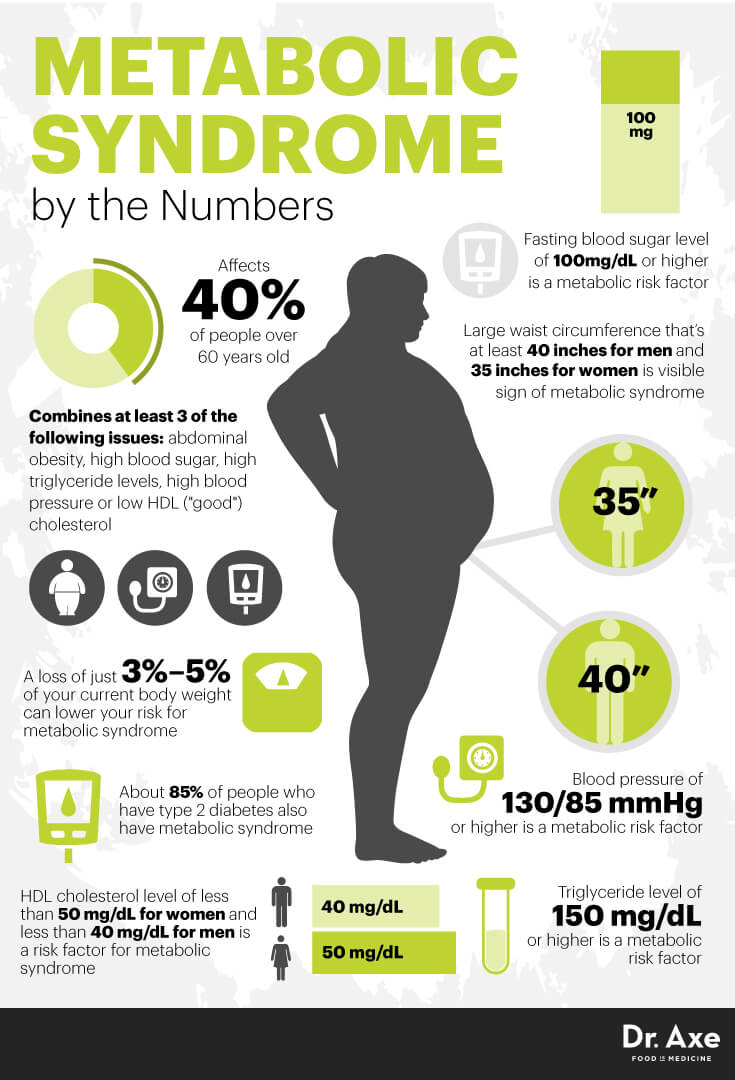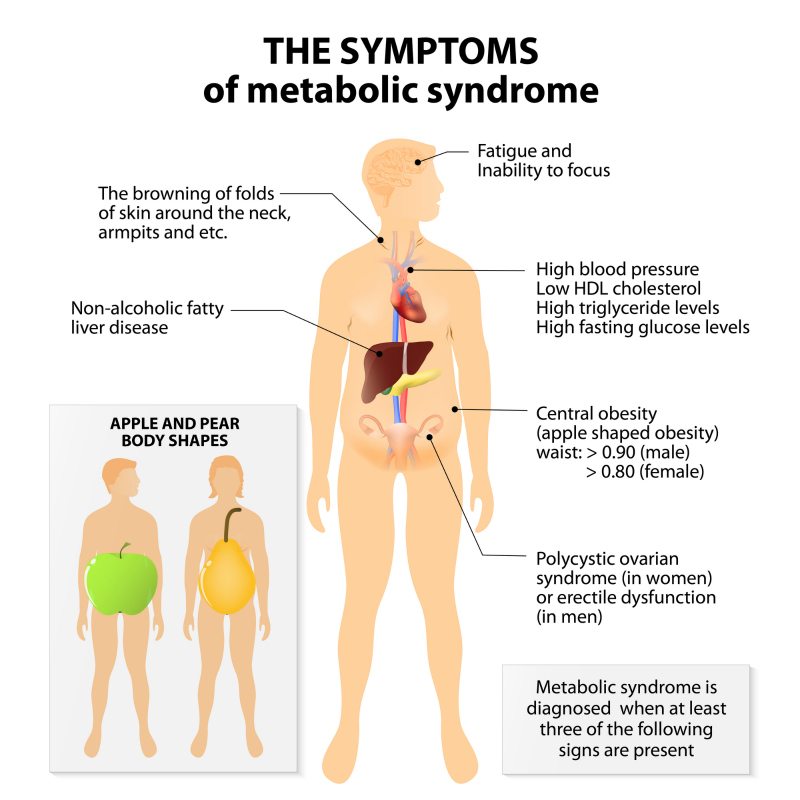Metabolic syndrome: What it means to you now

What is metabolic syndrome you may ask?
Well, this often misconstrued syndrome has unfortunately left people with thoughts of confusion and utter misinformation to say the least. It's not your fault though. See, by definition, metabolic syndrome is
defined as:
Metabolic syndrome is basically the name for a group of risk factors that raises your risk of heart disease and other health problems, such as diabetes and stroke.
The five conditions described below are metabolic risk factors. You can have any one of these risk factors by itself, but they tend to occur together. You must have at least three metabolic risk factors to be diagnosed with metabolic syndrome (nhlbi.nih.gov).
#1) High fasting blood sugar (or you're on medicine to treat high blood sugar). Mildly high blood sugar may be an early sign of diabetes.
#2) High blood pressure (or you're on medicine to treat high blood pressure). Blood pressure is the force of blood pushing against the walls of your arteries as your heart pumps blood. If this pressure rises and stays high over time, it can damage your heart and lead to plaque buildup.
#3) A low HDL cholesterol level (or you're on medicine to treat low HDL cholesterol). HDL sometimes is called "good" cholesterol. This is because it helps remove cholesterol from your arteries. A low HDL cholesterol level raises your risk for heart disease.
#4) A high triglyceride level (or you're on medicine to treat high triglycerides). Triglycerides are a type of fat found in the blood.
#5) A large waistline. This also is called abdominal obesity or "having an apple shape." Excess fat in the stomach area is a greater risk factor for heart disease than excess fat in other parts of the body, such as on the hips.
Your risk for heart disease, diabetes, and stroke increases with the number of metabolic risk factors you have. The risk of having metabolic syndrome is closely linked to overweight and obesity and a lack of physical activity.
Insulin resistance also may increase your risk for metabolic syndrome. Insulin resistance is a condition in which the body can’t use its insulin properly. Insulin is a hormone that helps move blood sugar into cells where it’s used for energy. Insulin resistance can lead to high blood sugar levels, and it’s closely linked to overweight and obesity. Genetics (ethnicity and family history) and older age are other factors that may play a role in causing metabolic syndrome.
Metabolic syndrome is becoming more common due to a rise in obesity rates among adults. In the future, metabolic syndrome may overtake smoking as the leading risk factor for heart disease.
It is possible to prevent or delay metabolic syndrome, mainly with lifestyle changes. A healthy lifestyle is a lifelong commitment. Successfully controlling metabolic syndrome requires long-term effort and teamwork with your health care providers.
Metabolic syndrome to you should mean that you should give it the zenith of your efforts to make sure that you do not acquire such atrocities. Thankfully, now, there are many known means that one can take advantage of to help prevent metabolic syndrome.
Exercise is not something that one should simply look over as it can greatly help you to make sure that this syndrome doesn't manifest itself into your being.
The concept of simply 'Eating right' shouldn't be misconstrued. More importantly, the focus should be on limiting the amount of sugars that you consume.
[caption id="attachment_23316" align="aligncenter" width="735"] Image Credit: Dr.Axe
[/caption]
Image Credit: Dr.Axe
[/caption]
Controlling your blood pressure is extremely important as well to make sure that you don't develop metabolic syndrome. This, of course, means controlling your saturated fat and salt intake.
As a quick tip, try cooking your foods with some type of oil (if you don't already do so), such as olive oil, vegetable oil, or any other oil that is high in unsaturated fats and low in saturated fats. As you may or may not know, unsaturated fats and omega fats (3's and 6's) help to lower the bad LDL (low density lipoprotein) cholesterol and raise your good HDL (high density lipoprotein) cholesterol. This is vital for ensuring optimal heart health.
Also, excess belly fat has been known to be connected to severe health problems. This is not to say that if you happen to have a small gut that you are necessarily very unhealthy. It can simply mean that you are just more predisposed to acquiring a health ailment. So, participating in a consistent cardio and weight resistant program , along with a healthy diet of course, will immensely decrease your chances of acquiring the metabolic syndrome.
[box type="info" align="" class="" width=""]
"The simplest way to look at all these associations, between obesity, heart disease, type 2 diabetes, metabolic syndrome, cancer, and Alzheimer's (not to mention the other the conditions that also associate with obesity and diabetes, such as gout, asthma, and fatty liver disease), is that what makes us fat - the quality and quantity of carbohydrates we consume - also makes us sick." ― Gary Taubes, Why We Get Fat: And What to Do About It
https://www.youtube.com/watch?v=bTUspjZG-wc
[/box]
When I was little I was as skinny as a rake, but at the ripe old age of 18, I started lifting weights seriously. I trained and competed as a natural bodybuilder in the SNBF and NANBF organizations, placing 4th in the novice men middleweight division at the 2012 Atlanta SNBF Championships. A year later, I competed and placed 2nd in the collegiate men division at the 2013 NANBF Natural Southern States Classic in St. Louis, Missouri. That solidified my goal to help others achieve greater levels of fitness. Today, I'm an avid blogger focused on creating content to help people improve their physical and mental health. For more of my work, check out my website Disorders.net to get information on how to improve your mental health.
" A cluster of biochemical and physiological abnormalities associated with the development of cardiovascular disease and type 2 diabetes. "
Metabolic syndrome is basically the name for a group of risk factors that raises your risk of heart disease and other health problems, such as diabetes and stroke.
Top 5 metabolic risk factors
The five conditions described below are metabolic risk factors. You can have any one of these risk factors by itself, but they tend to occur together. You must have at least three metabolic risk factors to be diagnosed with metabolic syndrome (nhlbi.nih.gov).
#1) High fasting blood sugar (or you're on medicine to treat high blood sugar). Mildly high blood sugar may be an early sign of diabetes.
#2) High blood pressure (or you're on medicine to treat high blood pressure). Blood pressure is the force of blood pushing against the walls of your arteries as your heart pumps blood. If this pressure rises and stays high over time, it can damage your heart and lead to plaque buildup.
#3) A low HDL cholesterol level (or you're on medicine to treat low HDL cholesterol). HDL sometimes is called "good" cholesterol. This is because it helps remove cholesterol from your arteries. A low HDL cholesterol level raises your risk for heart disease.
#4) A high triglyceride level (or you're on medicine to treat high triglycerides). Triglycerides are a type of fat found in the blood.
#5) A large waistline. This also is called abdominal obesity or "having an apple shape." Excess fat in the stomach area is a greater risk factor for heart disease than excess fat in other parts of the body, such as on the hips.
Overview of Metabolic Syndrome
Your risk for heart disease, diabetes, and stroke increases with the number of metabolic risk factors you have. The risk of having metabolic syndrome is closely linked to overweight and obesity and a lack of physical activity.
Insulin resistance also may increase your risk for metabolic syndrome. Insulin resistance is a condition in which the body can’t use its insulin properly. Insulin is a hormone that helps move blood sugar into cells where it’s used for energy. Insulin resistance can lead to high blood sugar levels, and it’s closely linked to overweight and obesity. Genetics (ethnicity and family history) and older age are other factors that may play a role in causing metabolic syndrome.
Here's a Quick Outlook on metabolic disease
Metabolic syndrome is becoming more common due to a rise in obesity rates among adults. In the future, metabolic syndrome may overtake smoking as the leading risk factor for heart disease.
It is possible to prevent or delay metabolic syndrome, mainly with lifestyle changes. A healthy lifestyle is a lifelong commitment. Successfully controlling metabolic syndrome requires long-term effort and teamwork with your health care providers.
[tweet_box inject="#MetabolicSyndrome " design="box_9"]"BMI tells you how big you are not how SICK you are" [/tweet_box]
The information in this article that was provided was courtesy of http://www.nhlbi.nih.gov/health/health-topics/topics/ms
Now that you know what metabolic syndrome is, what does it mean to you ?
Metabolic syndrome to you should mean that you should give it the zenith of your efforts to make sure that you do not acquire such atrocities. Thankfully, now, there are many known means that one can take advantage of to help prevent metabolic syndrome.
Exercise is not something that one should simply look over as it can greatly help you to make sure that this syndrome doesn't manifest itself into your being.
The concept of simply 'Eating right' shouldn't be misconstrued. More importantly, the focus should be on limiting the amount of sugars that you consume.
[caption id="attachment_23316" align="aligncenter" width="735"]
 Image Credit: Dr.Axe
[/caption]
Image Credit: Dr.Axe
[/caption]Controlling your blood pressure is extremely important as well to make sure that you don't develop metabolic syndrome. This, of course, means controlling your saturated fat and salt intake.
As a quick tip, try cooking your foods with some type of oil (if you don't already do so), such as olive oil, vegetable oil, or any other oil that is high in unsaturated fats and low in saturated fats. As you may or may not know, unsaturated fats and omega fats (3's and 6's) help to lower the bad LDL (low density lipoprotein) cholesterol and raise your good HDL (high density lipoprotein) cholesterol. This is vital for ensuring optimal heart health.
Also, excess belly fat has been known to be connected to severe health problems. This is not to say that if you happen to have a small gut that you are necessarily very unhealthy. It can simply mean that you are just more predisposed to acquiring a health ailment. So, participating in a consistent cardio and weight resistant program , along with a healthy diet of course, will immensely decrease your chances of acquiring the metabolic syndrome.
[box type="info" align="" class="" width=""]
"The simplest way to look at all these associations, between obesity, heart disease, type 2 diabetes, metabolic syndrome, cancer, and Alzheimer's (not to mention the other the conditions that also associate with obesity and diabetes, such as gout, asthma, and fatty liver disease), is that what makes us fat - the quality and quantity of carbohydrates we consume - also makes us sick." ― Gary Taubes, Why We Get Fat: And What to Do About It
https://www.youtube.com/watch?v=bTUspjZG-wc
[/box]
Author Bio: Thomas Hlubin

When I was little I was as skinny as a rake, but at the ripe old age of 18, I started lifting weights seriously. I trained and competed as a natural bodybuilder in the SNBF and NANBF organizations, placing 4th in the novice men middleweight division at the 2012 Atlanta SNBF Championships. A year later, I competed and placed 2nd in the collegiate men division at the 2013 NANBF Natural Southern States Classic in St. Louis, Missouri. That solidified my goal to help others achieve greater levels of fitness. Today, I'm an avid blogger focused on creating content to help people improve their physical and mental health. For more of my work, check out my website Disorders.net to get information on how to improve your mental health.





































































































